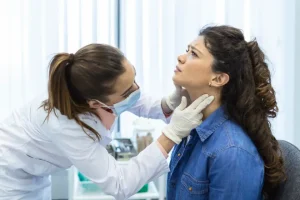Understanding the Genetic Factors in Urological Cancers
This blog explores how genetic factors in cancer influence the development of urological cancers such as prostate, kidney, and bladder cancer. It highlights the importance of recognising hereditary kidney disease…
By Aadicura | 20 June 2025This blog explores how genetic factors in cancer influence the development of urological cancers such as prostate, kidney, and bladder cancer. It highlights the importance of recognising hereditary kidney disease and a family history of prostate cancer, as well as the role of genetic testing and counselling in early diagnosis and personalised treatment. The blog also introduces readers to the advanced services offered by the Aadicura Urology Department in Vadodara – a trusted super speciality hospital for urology – with insights from expert urologist doctors. Learn how early action can improve outcomes and what steps to take if you’re at high genetic risk.
Unravelling the Genetic Code Behind Urological Cancers
When it comes to cancer, genetics can play a significant role – especially in urological cancers such as prostate, kidney, and bladder cancer. For many, these conditions don’t arise merely from lifestyle or age, but from inherited mutations passed down through generations. At Aadicura Superspeciality Hospital, we believe that understanding your genetic risk empowers you to make informed choices, seek timely screenings, and adopt personalised treatment pathways.
What Are Genetic Factors?
Genetic factors refer to specific inherited changes or mutations in your DNA that can increase the risk of developing certain cancers. These alterations may not always cause cancer directly but can heighten your susceptibility – particularly when combined with environmental or lifestyle influences.
In urological cancers, mutations in specific genes such as BRCA1, BRCA2, HOXB13, and VHL have been linked to a higher risk of prostate and kidney cancers.
Common Urological Cancers with Genetic Links
- Prostate Cancer
Genetics accounts for a significant proportion of prostate cancer cases. Mutations in BRCA2 or HOXB13 genes can significantly elevate risk, especially when the cancer occurs before the age of 55. - Kidney Cancer
Hereditary conditions like von Hippel-Lindau (VHL) disease and Hereditary Papillary Renal Carcinoma (HPRC) are examples of kidney cancers with a strong genetic basis. - Bladder Cancer
While less commonly inherited, certain genetic predispositions may interact with environmental risk factors (like smoking or chemical exposure) to increase susceptibility.
Family History and Inherited Risk
A family history of urological cancers – particularly if multiple close relatives have been diagnosed or if the diagnosis occurred at a younger age, can be a red flag. For instance:
- A brother or father with prostate cancer doubles your risk.
- Inherited syndromes can lead to multi-organ cancer risks, including in the kidneys and bladder.
Genetic Testing and Counseling
Genetic testing involves analysing your DNA (often via a simple blood or saliva sample) to identify mutations linked to urological cancers. At Aadicura, we provide:
- Pre-test genetic counselling to assess your personal and family history
- Targeted genetic panels for urological cancers
- Post-test counselling to interpret the results and guide next steps
Knowing your genetic status can not only aid in early detection but also help family members evaluate their own risks.
How Genetic Mutations Affect Treatment
Genetic insights are transforming how we treat urological cancers. For example:
- Prostate cancer patients with BRCA mutations may benefit from targeted therapies like PARP inhibitors.
- Kidney cancer linked to VHL mutation might require different surveillance protocols and surgical approaches.
- Knowing the genetic landscape helps in choosing between active surveillance, surgery, or systemic therapies.
Preventive Measures for High-Risk Individuals
For those with inherited risks, early action can save lives. Aadicura recommends:
- Regular screenings such as PSA tests for prostate cancer or abdominal imaging for kidney issues
- Lifestyle modifications: avoiding smoking, maintaining healthy weight, and regular exercise
- Prophylactic treatments or close surveillance based on your genetic profile
Aadicura’s Urology Services
As a leading super speciality hospital for urology, Aadicura’s dedicated Urology Department in Vadodara provides comprehensive services led by experienced urologist doctors and surgical teams. We offer:
- Advanced diagnosis and treatment of prostate, kidney, and bladder cancers
- Collaboration with genetic counsellors for at-risk individuals
- Minimally invasive surgeries and state-of-the-art equipment
- Personalised treatment plans aligned with your genetic profile
Genetics as a Window Into Proactive Urological Health
Understanding your genetic blueprint could be the key to unlocking early, effective intervention for urological cancers. At Aadicura Superspeciality Hospital, we integrate compassionate care with advanced genetic and clinical expertise, helping you take control of your health before symptoms even appear. Don’t wait for signs – take a proactive step today.
FAQs
Should I undergo genetic testing if my parents had prostate cancer?
If you have a family history, especially of early-onset cancers, genetic testing is often recommended.
What is the benefit of knowing your genetic risk?
It enables early screening, preventive strategies, and tailored treatments, increasing survival chances.







